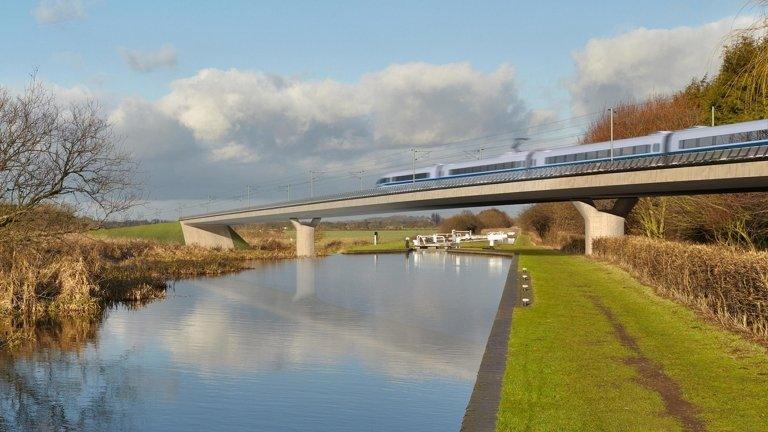HS2 and the new North-South divide
- Published
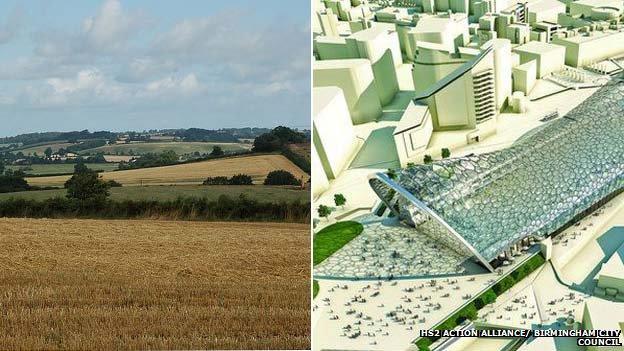
Residents of rural Northamptonshire have huge concerns about the plans for high speed rail, while Birmingham City Council is drawing up plans for a futuristic station
HS2 - the proposed high-speed rail link - is supposed to help bridge the North-South divide. But the debate surrounding the controversial project has arguably opened up a divide between councils in the North, which welcome the scheme, and those further south which do not.
Set in a peaceful valley, surrounded by tranquil farmland, the hamlet of Lower Thorpe Mandeville, in rural Northamptonshire, has stood almost undisturbed for centuries.
Yet residents are rapidly moving out, victims of what the government views as the march of progress.
The hamlet lies on the route of one of the government's most cherished - and controversial - projects: the high-speed rail link from London to Birmingham and the North, otherwise known as HS2.
Harriet Raitt is the only resident in her hamlet who does not qualify for compensation, despite the proposed route crossing a yet-to-be-built viaduct just 90m from the Victorian cottage she has lived in with her husband for 30 years.
"The community will be untenable - in fact, it no longer is a community," she said. "The construction traffic will wreck the nearby villages.
"I think everybody is now feeling incredibly ground down by HS2. It feels as if nobody is listening to anything we say."
Mrs Raitt also harbours serious doubts about the worth of the scheme.
"To claim HS2 will benefit the North, as the government does, is far-fetched," she said. "I have relatives in Manchester who are asking, 'Why would we want to go down to London?'
"It will just suck everything down south again, instead of investing in infrastructure for the regions."
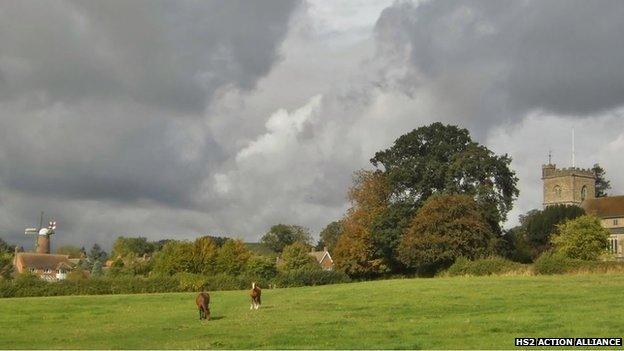
Buckinghamshire County Council is one of several authorities north of London to have taken issue with the plans
Throughout Northamptonshire, Warwickshire and neighbouring Leicestershire, you can find people who think as Mrs Raitt does.
Four major local authorities in the area - Warwickshire, Coventry, Leicester and Leicestershire - are all unanimous in their protest against the project, while Northamptonshire says it cannot support the scheme as it stands and is demanding a number of reassurances from the government.
Staffordshire, Buckinghamshire, Essex and Oxfordshire are equally opposed.
Venture further north, however, and the mood changes.
Councils such as Leeds and Manchester are welcoming the train to their towns. Even cities where HS2 is going nowhere near, like Hull and Newcastle, are supportive of the proposals.
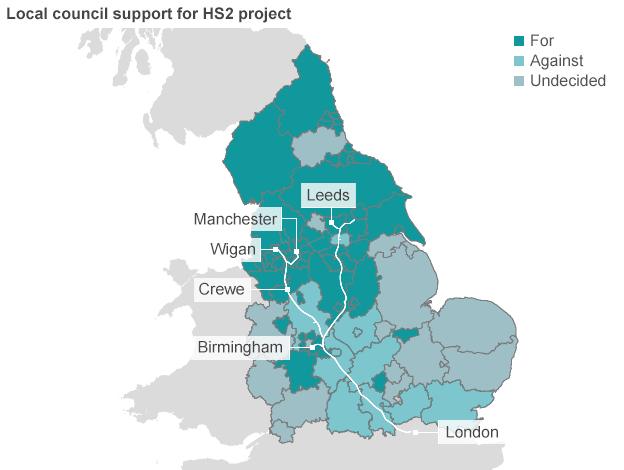
Support for HS2 is largely confined to northern councils
"The North East considers high-speed rail offers a once-in-a-generation opportunity to transform the economic geography of the UK," said Northumberland County Council in a statement.
Neighbouring councils, such as Stoke and Crewe and Derby and Nottingham, are even locked in a tussle to get HS2's favours bestowed on them.
The government insists HS2 will help bridge the North-South divide, in which economic activity in London and the South East dominates the country's output.
But is the debate and contention about the controversial route in fact creating a new schism that lies somewhere between the Midlands and the North?


Julie Carrier, from Leeds, believes HS2 is needed to reduce congestion
Julie Carrier travels by train at least twice a week from Leeds to London in her role as a civil engineer at consultancy firm WSP which, in 2013, carried out an independent report for West Yorkshire Metro to review the economic case for HS2 in the Leeds and Sheffield regions.
For her, HS2 cannot come fast enough.
"Quite frankly, in the North our expectations of our trains are slightly different to those in London," she said.
"In London, if a tube runs a minute late, they get a little bit irritated. Up here, we just want a train that is not too delayed and if we get a seat it's nice.
"If we can just get somewhere on time, we're generally quite pleased."
Ms Carrier's Leeds home is just a few miles from the proposed route and she said she understood people might be anxious about the line.
But she feels the benefits of HS2 to the North, where journey times to London could be cut by an hour from Manchester and 49 minutes from Leeds, are worth the pain.
"We need to learn the lessons of what transport has done for London and bring that further north," she said.
"Overcrowding and congestion is a serious problem at the moment."

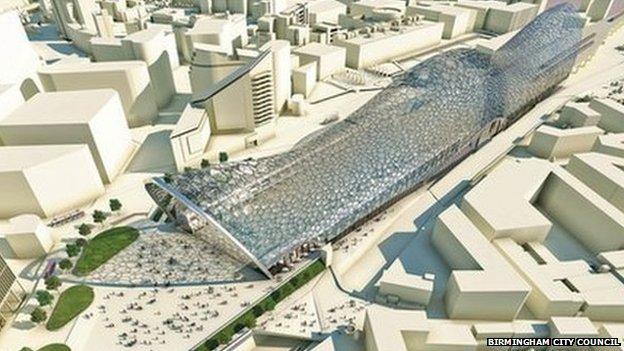
Curzon Street will become the Birmingham hub for the first phase of the HS2 high speed line
It is perhaps hardly surprising that northern cities welcome major rail investment.
"I suspect there is a bit of, 'we will take whatever we can get'," said Dr Alasdair Rae, a senior lecturer in urban studies and planning at the University of Sheffield.
"The northern cities have suffered from years and years of neglect.
"Many of the northern, urban authorities, which are Labour-supporting, have supported HS2 from its inception," said Will Rossiter, of Nottingham Business School.
"For them, HS2 represents a major opportunity in terms of optimising their economic performance.
"In the Home Counties, though, there's a huge amount of opposition to HS2. The perception is they will have to endure an awful lot of pain for few of the perceived benefits. And they already have pretty good connections to London."
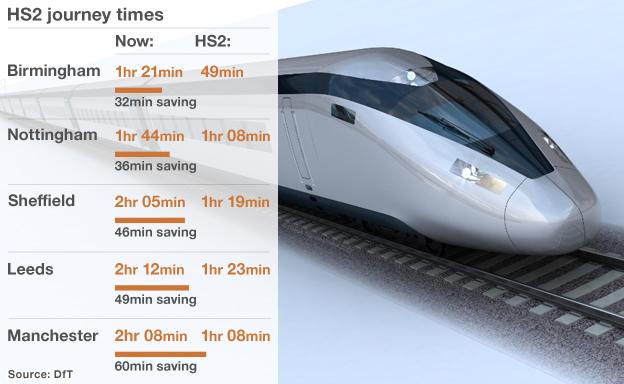
Considering the perceived lack of public support it is "strange", in Dr Rae's opinion, that a Conservative coalition government has adopted a policy that is so alien to its core voters.
"We've got a Tory-led government pursuing a strategy for a train line that rolls through their core vote in the Home Counties to connect traditionally Labour-voting northern cities," he said.
"HS2 is a highly symbolic investment," added Mr Rossiter. "But it is also an investment which is quite distant.
"It does strike me that, from a political point of view, this is a way of the government demonstrating they are doing something about regional economic development at a time when they are drawing significant funds out of that arena.
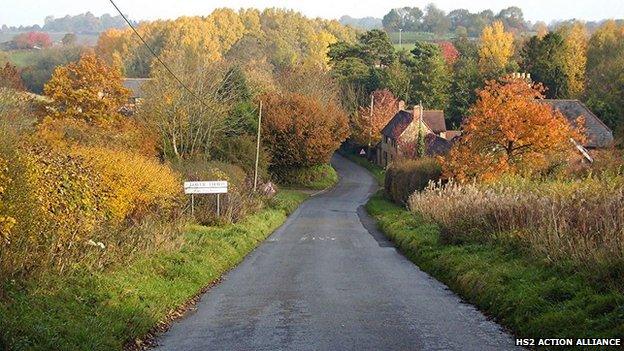
Villagers in Lower Thorpe Mandeville, in Northamptonshire, say they will see their community destroyed
"It is hard not to see HS2 as a means of the government being seen to be doing something.
"I suppose the government's calculation is that while southern voters might be brassed off, they are not going to be so brassed off they won't vote Conservative at the next election."
However, Dr Rae said improved rail services between northern cities would be a better use of public money.
"At the moment, the craziest thing is how difficult it is to get around the North," he added. "Getting from Manchester to Sheffield, by road or rail, is such a pain.
"The rhetoric is about bringing the north up to speed but we currently have a railway line between Leeds and Manchester that was built with hand-tools and wheelbarrows.
"Connecting the northern cities would be a cheaper and arguably more effective policy. If I were the Chancellor, that's what I would do."
Correction 26 September 2014: This article has been amended to better balance the wide range of views and backgrounds of interviewees.
- Published6 October 2023
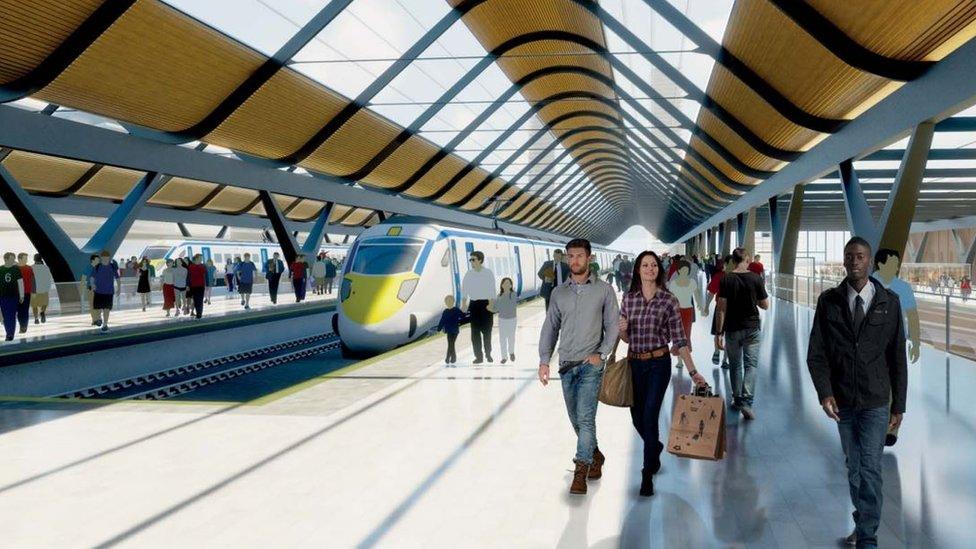
- Published28 January 2013
